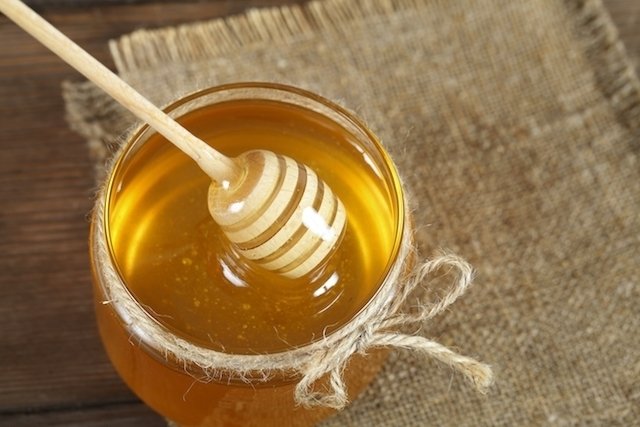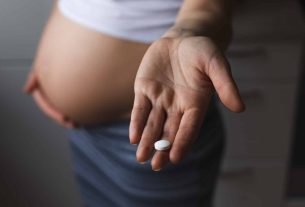Giving honey to your baby can be dangerous, especially for babies under 1 year old, due to the risk of infant botulism. Honey is also rich in sugars and is not a recommended food for children under 2 years of age.
Botulism is a disease caused by toxins produced by bacteria Clostridium botulinum, which is present in soil and agricultural products such as legumes, vegetables and honey, and can cause symptoms such as paralysis and difficulty breathing. Understand better what botulism is.
If you have any doubts about the foods that should be avoided for your baby, it is recommended that you consult a pediatrician, who is the best doctor to guide the child’s diet and assess whether the baby is growing properly.

Risks of honey for the baby
It is not recommended to give honey to babies under 1 year old due to the risk of botulism. The bacteria Clostridium botulinumwhich causes botulism, can be found in honey and produce toxins that cause the disease when ingested by a baby.
Furthermore, honey is a food rich in sugars, which can harm the development of a baby’s taste, increase the risk of cavities, excessive weight gain and diseases in adulthood, and is not recommended for babies under 2 years old. Understand how a 2-year-old child should be fed.
Consult your nearest pediatrician, using the tool below, to find out more about the risks of honey for your baby:
Taking care of your health has never been easier!
When can you give honey to your baby?
According to the Brazilian Society of Pediatrics, it is possible to give honey to babies from 1 year old. However, as honey is a food of low nutritional quality and rich in sugar, it should be avoided before 2 years of age. Find out how to consume honey and when it is contraindicated.
Although there are some brands of honey that are currently certified by the National Health Surveillance Agency (ANVISA), and that are within the quality standards imposed by the government, the ideal is not to provide honey to babies under 1 year old, as it does not there is a guarantee that this bacteria has been completely removed.
What to do if you give honey to your baby
If a person gives honey to a baby under 1 year of age, it is important to be careful in case the baby develops symptoms of infant botulism, such as:
- Slower feeding;
- Constipation;
- Weak crying;
- Decreased limb movements;
- Reduction of facial movements;
- Muscle flaccidity.
Symptoms of infant botulism are most common between 3 and 30 days after ingesting honey and, if they appear, it is recommended to consult a pediatrician as soon as possible or go to a pediatric emergency room for evaluation. Find out more symptoms of infant botulism.
In the most serious cases, botulism can put the baby’s life at risk, and it is important that it is identified and treated as soon as possible.
Bibliography
- BVS. Botulism. 2020. Available at: <https://bvsms.saude.gov.br/botulismo/>. Accessed on Aug 21, 2023
- AAP NEWS. Remind families: honey can cause infant botulism. 2018. Disponível em: <https://publications.aap.org/aapnews/news/13225/Remind-families-honey-can-cause-infant-botulism?autologincheck=redirected>. Acesso em 21 ago 2023
- HEALTHCHILDREN.ORG. Botulism. Disponível em: <https://www.healthychildren.org/English/health-issues/conditions/infections/Pages/Botulism.aspx>. Acesso em 21 ago 2023
- BRAZILIAN SOCIETY OF PEDIATRICS. SCIENTIFIC DEPARTMENT OF NUTROLOGY. Nutrition Manual: guidelines for feeding from infants to adolescents, at school, during pregnancy, disease prevention and food safety. 2018. . Accessed on Jul 28, 2021
- MANUAL FOR HEALTHCARE PROFESSIONALS. Botulism. 2018. Available at: <https://www.msdmanuals.com/pt-pt/profissional/doen%C3%A7as-infecciosas/bact%C3%A9rias-anaer%C3%B3bias/botulismo>. Accessed on 14 Jul 2020
- MARTINS, Barbara XB et al. Types of Botulism: a literature review. Bibliographic Review, 2019. Faculdade Única de Ipatinga.
- MINISTRY OF HEALTH. Why shouldn’t children under 2 eat sugar?. Available at: <https://www.gov.br/saude/pt-br/assuntos/saude-brasil/eu-quero-me-alimentar-melhor/noticias/2021/vamos-criancas-menores-de-2- years-old-should-not-eat-sugar>. Accessed on Aug 21, 2023
- Scientific Department of Nutrology and Outpatient Pediatrics Brazilian Society of Pediatrics. Practical guide to feeding children aged 0 to 5 years. São Paulo: SBP, 2021. 55.
- STATPEARLS. Infantile Botulism. 2023. Available at: <https://www.ncbi.nlm.nih.gov/books/NBK493178/>. Accessed on Aug 21, 2023
- BURNS, Dennis A. R. et al. Textbook of Pediatrics of the Brazilian Society of Pediatrics. 4th ed. Barueri, SP: Editora Manole, 2017. 1412.
- RURAL SCIENCE. Foodborne botulism. Available at: <https://www.scielo.br/pdf/cr/v38n1/a49v38n1.pdf>. Accessed on 14 Jul 2020

Sign up for our newsletter and stay up to date with exclusive news
that can transform your routine!
Warning: Undefined array key "title" in /home/storelat/public_html/wp-content/plugins/link-whisper-premium/templates/frontend/related-posts.php on line 12
Warning: Undefined array key "title_tag" in /home/storelat/public_html/wp-content/plugins/link-whisper-premium/templates/frontend/related-posts.php on line 13




